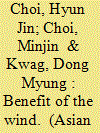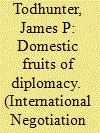| Srl | Item |
| 1 |
ID:
186805


|
|
|
|
|
| Summary/Abstract |
The "rally-'round-the-flag effect" sparked by North Korea (the so-called 'Northern Wind') has been an important part of South Korean domestic politics. Despite the long history and controversy associated with politics of Northern Wind, the literature provides surprisingly little quantitative evidence on this phenomenon. In this study, we empirically investigate the relationship between North Korean-induced incidents and former President Park Geun-hye's weekly job approval ratings. Using vector autoregressions, we find that (1) President Park gained political benefits from North Korea, where negative events (e.g., armed attacks) generated a larger boost in approval than positive events (e.g., high-level talks); (2) rally effects varied across regions according to different perceptions of the North Korean regime: during security crisis, Park received the largest rallies in Gyeongnam province where the dominant image of North Korea was an 'enemy that threatens our safety'; and (3) a test of nuclear weapons or intercontinental ballistic missiles (ICBMs) did not affect approval ratings even though it captured widespread media attention.
|
|
|
|
|
|
|
|
|
|
|
|
|
|
|
|
| 2 |
ID:
179270


|
|
|
|
|
| Summary/Abstract |
Research has shown that major international events can produce a “rally ’round the flag” effect that boosts citizens’ support for an American president. This study examines such an effect in Taiwan, when the country was confronted by the COVID-19 pandemic. We find that citizens who previously disapproved of the president did become more likely to gather around their leader. The public’s support was contingent on the president’s ability to handle the crisis. This is one of the few studies on this effect conducted outside the US, and its findings represent a significant step toward broadening the scope of analysis.
|
|
|
|
|
|
|
|
|
|
|
|
|
|
|
|
| 3 |
ID:
123171


|
|
|
|
|
| Publication |
2013.
|
| Summary/Abstract |
Abstract The notion that national leaders use foreign policy actions for domestic political benefit is widely accepted in the foreign policy literature, but has only been studied with regard to foreign policy involving the use of force. Literature on third-party mediation has emerged separately and has not taken mediators' domestic political motivations and constraints into account when explaining mediation occurrence and outcomes. Diplomatic efforts such as mediation should be appealing to leaders seeking to impress their domestic audience because it provides them with a low risk opportunity to appear competent to their domestic audience. While mediation is a regular occurrence in US foreign policy, its public visibility varies greatly. However, models of presidential media coverage suggest that media outlets are likely to pay a disproportionate amount of attention to presidents and their high level surrogates while engaging in diplomacy overseas. The article proposes that the higher the profile of the official an administration sends to mediate a crisis overseas, the greater the increase in the president's approval rating. Additionally, the public's attentiveness to foreign policy should condition the effect of a high profile mediator on presidential approval. As foreign policy becomes more salient to the public, the effect of a higher profile mediator on presidential approval should be greater. Empirical results support the argument.
|
|
|
|
|
|
|
|
|
|
|
|
|
|
|
|